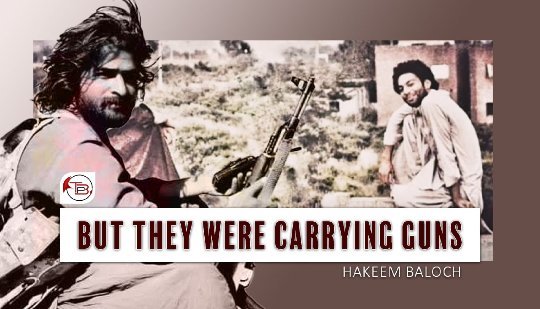Turkey committing war crimes as Turkish-backed forces are using munitions loaded with white phosphorus—a chemical that can maim and kill when it comes in contact with human flesh—in their violent campaign against Kurdish fighters in northern Syria.

Turkish proxies are intentionally using white phosphorus-loaded munitions to target civilians, that constitutes a war crime.
Evidences of use of Chemical Weapons by Turkey
A senior U.S. administration official show children from Ras al-Ain with severe chemical burns on their torsos and faces consistent with wounds from white phosphorus, though the exact substance has not yet been confirmed by independent investigators.

A Kurdish medical convoy and an American aid organization trying to evacuate wounded civilians was targeted by Turkish-backed forces and unable to enter the town.
As of 18-October 2019, there were more than 38 injured people inside the Ras al-Ain hospital who were unable to evacuate, according to the Kurdish Red Crescent, a humanitarian nonprofit organization that operates on the ground in northern Syria. The hospital was partially destroyed, and some patients died due to lack of blood and other medical care.
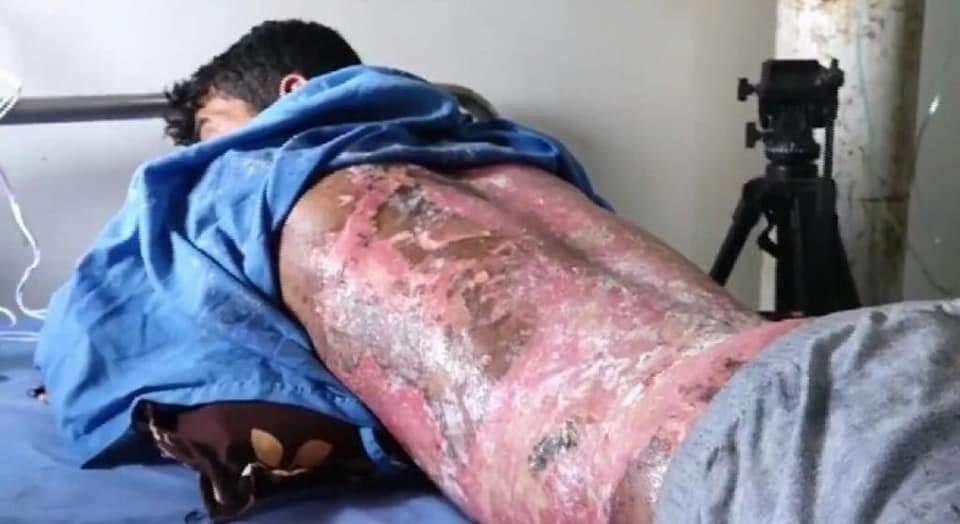
An official with the Kurdish Red Crescent told that six patients, including children and soldiers, arrived at the National Hospital in Hasakah city with first- and second-degree burns from an unknown substance after a Turkish airstrike in Ras al-Ain. The patients said they saw “strange lights” during the airstrike.
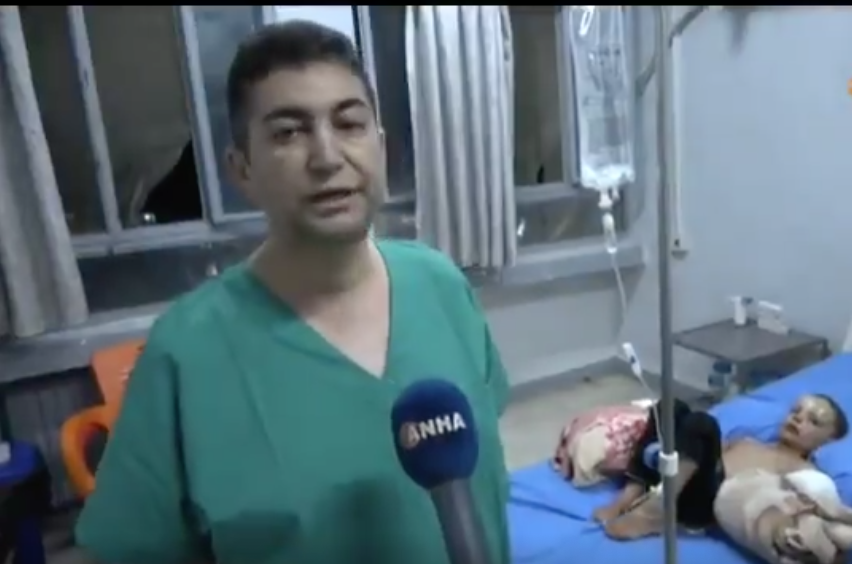
Separately, the official said victims from Ras al-Ain arrived at a hospital in Sulaymaniyah, a city in Iraqi Kurdistan, with similar symptoms. Those victims are showing more severe symptoms, such as difficulty breathing.
A Kurdish Red Crescent convoy tried to enter Ras al-Ain to collect additional evidence, such as clothing, to find out more about the substance but was fired on by Turkish-backed forces and had to retreat, the official said.
The use of chemical weapons was also documented by Mustafa Bali, head of media relations for the Syrian Democratic Forces (SDF)—the Kurdish-led group currently trying to keep the Turkish invasion into northern Syria at bay.
“After eight days of fierce resistance by our fighters against heavy ground and aerial attacks of Turkey in Serekaniye, we suspect that unconventional weapons are used against SDF fighters upon the reports and signs we receive from the besieged town,” Bali said on Twitter.
“We urge international organizations to send their teams to investigate some wounds sustained in attacks. The medical facilities in NE Syria lack expert teams following withdrawal of NGOs due to Turkish invasion attacks.”
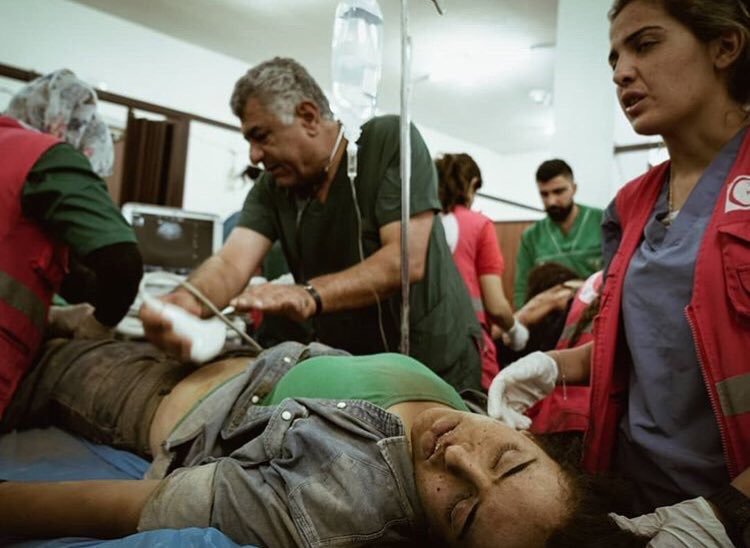
A corresponding video shows several children with severe burns around the body and face.
In a letter written by Bassam Saker, the representative of the Syrian Democratic Council (SDC) to the United States, the co-secretaries of the SDC’s health department, Rapareen Hasn and Manal Mhemed, urgently called on the international community to evacuate the wounded civilians.
“Turkey uses all kind of weapons including the internationally prohibited ones, and our medical teams are unable to evacuate the civilians,” according to the letter, which was also confirmed by the senior U.S. administration official. Saker confirmed that the prohibited weapons referred to in the letter are suspected to be “unusual bombs” loaded with white phosphorus.
A former combat medic who deployed to Syria in 2017-2018 separately confirmed that the photos appeared to show chemical burns.

Hamish de Bretton-Gordon, a former commander of the UK’s chemical, biological, radiological and nuclear regiment, said: “The most likely culprit is white phosphorus. It is a horrific weapon, and has been used repeatedly during the Syrian civil war; unfortunately, its use has become increasingly normalised.”
A member of the Rojava diplomacy office on Friday said it had documented a number of suspicious cases and restated calls for international organisations to investigate since it lacked capacity on its own.
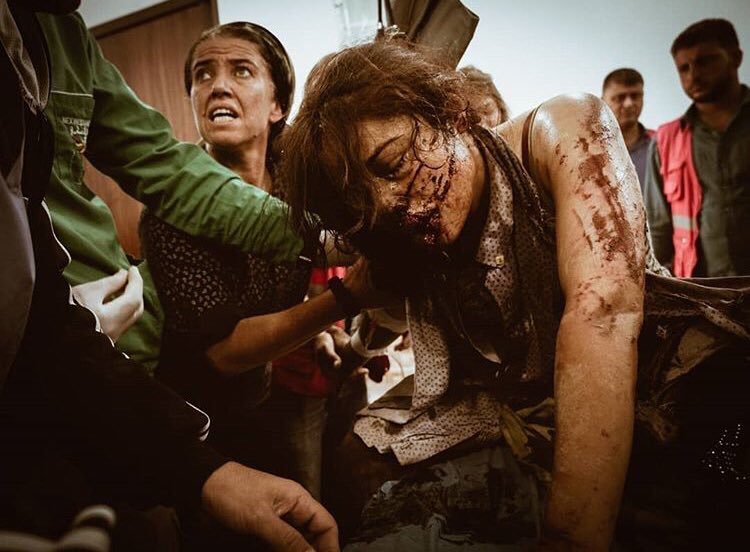
The United States is aware of the claims that Turkish proxies have used white phosphorus and the possible evidence that supports that claim, the senior U.S. administration official said.

“Turkey will be held accountable by the international community for the crimes they commit against the Kurds,” the official said.
Turkish proxies are deliberately using white phosphorus against civilians. The use of white phosphorus in military applications is not banned, but its use as an incendiary weapon in civilian areas is prohibited by international law.
White phosphorus-loaded munitions are used primarily by Western militaries to create smoke screens to mask the movement and position of forces but can also be used as incendiary weapons. When a shell explodes, the chemical inside immediately creates a thick white cloud. When the chemical comes in contact with flesh, it burns to the bone.

There is some debate over whether the use of munitions loaded with white phosphorus constitutes the use of a chemical weapon. The Organisation for the Prohibition of Chemical Weapons defines a chemical weapon as “a chemical used to cause intentional death or harm through its toxic properties.” The organization goes on to state that: “Munitions, devices and other equipment specifically designed to weaponise toxic chemicals also fall under the definition of chemical weapons.”
There have been reports that munitions loaded with white phosphorus have been used previously in Syria by Turkey. In April 2017, as per a report, Global chemical weapons investigators had gone to Turkey to collect samples as part of an inquiry into a chemical weapons attack in Syria that killed 87 people . As per another report in November 2011, 24 rebels, from the PKK guerrilla group, were killed in the Kazan Valley in air raids that began on 19-October 2011. The corpses were Blackened and dismembered, the only explanation for the type of burns exhibited is that some chemical agent was used. Human Rights organizations were sent to Turkey to investigate for Chemical weapons. Another experts at Hamburg University Hospital shown photographs of similarly scorched and burned bodies from a strike in September 2009 also attributed the deaths to the “highly probable” use of “chemical substances”.

UN Organisation for the Prohibition of Chemical Weapons (OPCW) Reaction – Is OPCW sold out?
UN chemical weapons inspectors have announced they are gathering information following accusations that burning white phosphorus was used by Turkish forces against children in Syria earlier this week.
The Organisation for the Prohibition of Chemical Weapons (OPCW) said on Friday morning that “it was aware of the situation and is collecting information with regard to possible use of chemical weapons”.
A spokesperson for the U.N.’s Organisation for the Prohibition of Chemical Weapons (OPCW) said, “The OPCW is aware of the situation in northern Syria and is collecting information at OPCW Headquarters with regard to the alleged use of chemical weapons.
“So far, the OPCW has not yet determined the credibility of these allegations.”
The OPCW said “it has no indication so far of the use of any specific toxic chemical as a weapon”.
The allegations come as a press release on the OPCW website released on Thursday 17-October 2019 stated that Turkey donated €30,000 to the body in order to support construction of a new facility.

Turkey’s ambassador to the OPCW Şaban Dişli said in the accompanying statement, “The OPCW plays a significant role in the field of disarmament and international security and it is the central actor in the chemical non-proliferation regime.”
“This contribution is another display of the strong commitment of Turkey to the Chemical Weapons Convention and to the OPCW.”

Some people question the role of UN and its agencies. As per a person, “Was this meagre donation of €30,000 sufficient for a UN body OPCW to shut up its mouth against Turkey? That brings the credibility of UN as an International organization to a big question mark. It means the UN can be made to do anything by the powerful and the one who throws money at its different bodies and can get any favorable report.”
In a lower estimate of the death toll compared to the SOHR figures, the health authority of the Kurdish-led administration in the region put the civilian death toll at 218, including 21 children.
Amnesty International: Damning Evidence that Turkey carried out attacks on Civilians
Amnesty International said it had “damning evidence” that Turkey and its Syrian armed allies carried out indiscriminate attacks on residential areas, including on a home, a bakery and a school. Amnesty said these could amount to war crimes.
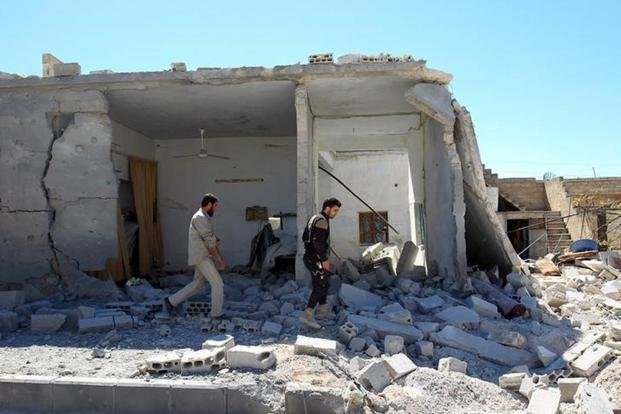
The rights group highlighted several instances of possible violations of international law including a 12 October Turkish airstrike next to a school in Salhiye, where civilians fleeing the conflict had sought shelter.
The group said that the frontline was at least a mile away and that four people including two children had been killed.
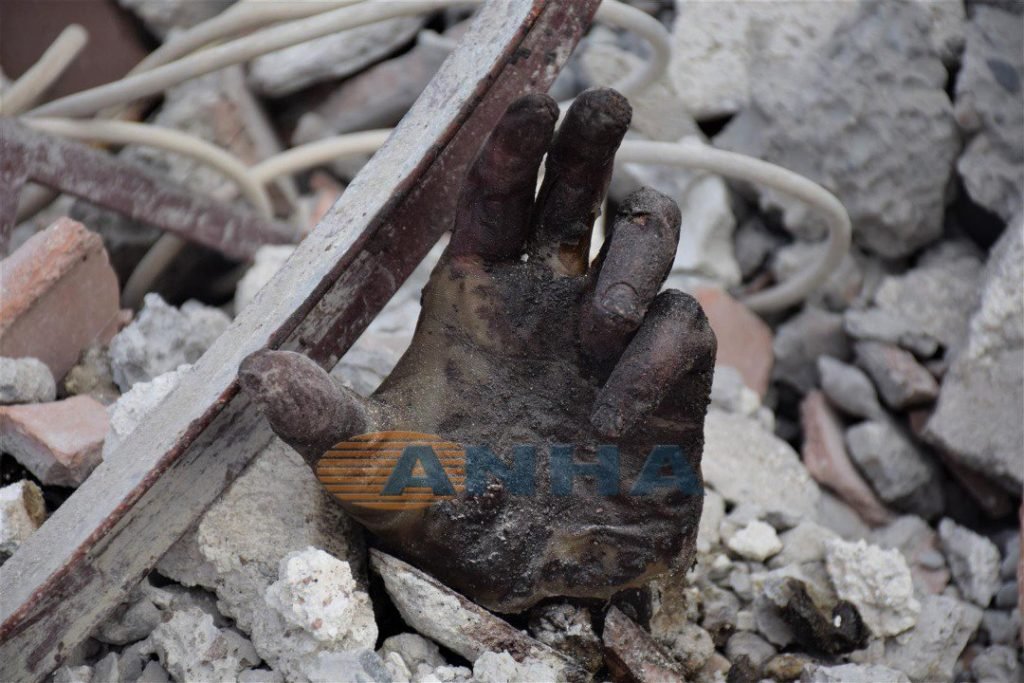
“They looked like charcoal,” an aid worker at the scene told Amnesty. “The other two people killed were older men, they looked older than 50. Honestly, I am still in shock.”
Another attack saw an airstrike hit a convoy of around 400 civilians travelling between Qamishli and Ras al-Ayn on 13 October. Amnesty said that a small contingent of fighters guarding the convoy did not justify the attack.

The airstrike, which was caught on camera, killed six civilians, including one journalist.
A reporter at the scene described it as “an absolute massacre”.
Amnesty also investigated a mortar attack on a home in Qamishli which killed an 11-year-old boy and ripped off the leg of his eight-year-old sister.
Finally, they detailed the 12 October “ambush” and “grisly murder” of Hervin Khalaf, a Kurdish politician, along the international highway linking Raqqa to the border town of Qamishli.

According to witnesses and footage of the scene Amnesty analysed, she was dragged out of her car, beaten and shot dead “in cold blood” by fighters from Ahrar al-Sharqiya, part of the Syrian National Army, a coalition of Syrian armed groups equipped and supported by Turkey.
A medical report showed she was hit by multiple gunshot wounds to the head, face and back. She also had fractures to her legs, face and skull, and her skin had been detached from her skull as a result of being dragged by the hair.
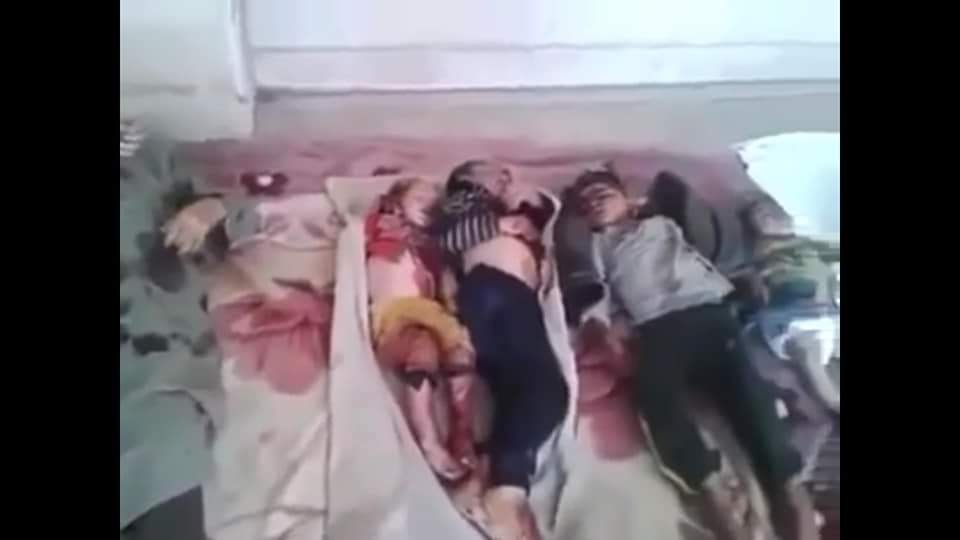
“Turkish military forces and their allies have displayed an utterly callous disregard for civilian lives, launching unlawful deadly attacks in residential areas that have killed and injured civilians,” said Kumi Naidoo, Amnesty International’s secretary-general.
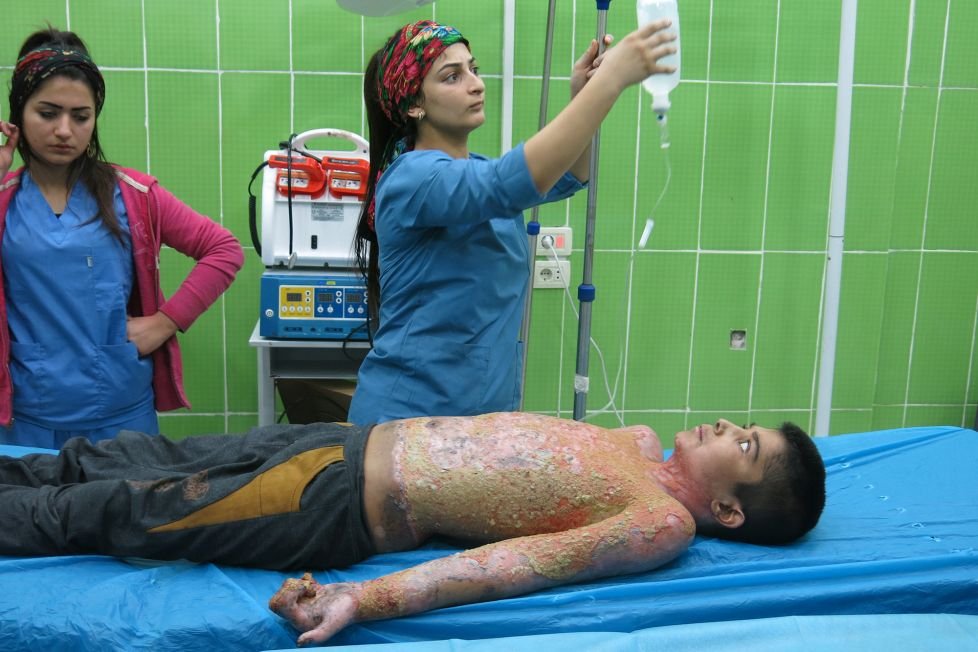
“We call on Turkey again to end violations, hold perpetrators accountable, and protect civilians living under their control. Turkey cannot evade responsibility by outsourcing war crimes to armed groups,” he added.
Ceasefire Agreement
In our previous article titled Why Is US Pulling Out Of Syria After It Declared To Pull Out Of Afghanistan? we covered in details why US is pulling out of Syria.
The United States and Turkey agreed Thursday 17-October 2019 to a temporary cease-fire in northern Syria that appeared to hand Ankara a major victory in its campaign to remove Kurdish fighters from its southern border. The tentative agreement negotiated by the United States was seen as a major victory for Ankara.
Under the terms of the ceasefire, the SDF would pull back from Turkey’s proposed 20-mile (32km) deep “safe zone” on its border.
But just hours after the announcement, reports emerged that Turkey continues to attack Kurdish fighters and civilian settlements in the border town of Ras al-Ain, apparently in violation of the ceasefire. Turkish-backed forces targeted a Kurdish medical convoy and an American aid organization trying to get into the town to evacuate wounded civilians, according to a Syrian conflict monitor.

Nine days into Turkey’s invasion of northern Syria, Ankara agreed to pause military operations for 120 hours while the United States facilitates the withdrawal of the Kurdish-led Syrian Democratic Forces (SDF) from a 20-mile safe zone along the border, U.S. Vice President Mike Pence announced in a press conference in Ankara on Oct. 17. Once the Kurdish fighters, which Turkey views as terrorists, are removed from the area, Ankara will implement a permanent cease-fire, Pence said.
“The United States will always be grateful for our partnership with [the] SDF in defeating ISIS, but we recognize the importance and value of a safe zone to create a buffer between Syria proper and the Kurdish population and the Turkish border,” Pence said, using an acronym for the Islamic State. “President [Donald] Trump sent us here to end the violence and to achieve an immediate cease-fire.”
Almost immediately after Pence spoke, Turkish Foreign Minister Mevlut Cavusoglu pushed back on how Pence framed the agreement, telling reporters it was a “pause” in Turkey’s operations but “not a cease-fire because a cease-fire takes place between two legitimate parties” and the operation was aimed at removing “terrorist elements” from the region.
The safe zone will encompass a massive area, ranging 280 miles from the Euphrates River to the border with Iraq and 18 miles into northern Syria, Cavusoglu said.
Some critics immediately slammed the agreement as handing Turkish President Recep Tayyip Erdogan a major win, effectively allowing him to extend Turkey’s borders into Kurdish-held territory.
As per one of the critic Brett McGurk, the former U.S. envoy for the coalition to defeat the Islamic State, who resigned from the Trump administration in December, wrote on Twitter, “The US just ratified Turkey’s plan to effectively extend its border 30km into Syria with no ability to meaningfully influence facts on the ground.”
“This is essentially the United States validating what Turkey did and allowing them to annex a portion of Syria and displace the Kurdish population,” a senior U.S. administration official, speaking on condition of anonymity as they were not authorized to speak to the media. “It is a huge win for Turkey, and the defeat ISIS mission is over.”
The safe zone will be primarily enforced by the Turkish armed forces, rather than the Turkish-backed proxy groups, primarily composed of Syrian army defectors and other rebels with links to extremist organizations, that have been terrorizing the local population, according to a joint statement released to reporters.
U.S. troops will not be involved in securing the zone, the senior U.S. administration official told. U.S. forces have already abandoned most of their outposts in northern Syria and will continue their withdrawal.
Criticism of Ceasefire Agreement
The incursion and the ceasefire have been widely criticized, including by the EU council president Donald Franciszek Tusk, who described the latter on Friday as “a demand of capitulation of the Kurds”.
In a joint statement the chairs of the foreign affairs committees in the UK, France, Germany, the EU and the US House of Representatives condemned the incursion as a military aggression and a violation of international law. The joint statement also said Trump’s decision to abandon the Syrian Kurds was likely to lead to a resurgence of Islamic terrorism, “marking another landmark in the change of American foreign policy in the Near and Middle East”.
Turkish-Backed Forces Are Freeing Islamic State Prisoners
Ankara’s radical proxies are also executing Kurdish prisoners and killing unarmed civilians, videos show.
U.S. Defense Secretary Mark Esper defended the decision to withdraw troops from the Turkey-Syria border even while sending additional forces to Saudi Arabia.
In Ankara, Pence said Turkey pledged not to take any military action against Kobani, a Syrian border town that has assumed outsized symbolic significance since Kurdish groups recaptured the town from the Islamic State in 2015 in one of the longest and bloodiest battles of the campaign.
Pence also said American diplomats had consulted with Kurdish forces and that they had pledged to abide by the agreement. But SDF officials did not immediately comment on the agreement, and it is far from clear that they will agree to a deal that codifies the military gains that they have fought to prevent Turkey from making.
The senior U.S. administration official said the SDF has privately voiced concern about the agreement. “They are unsure of what was agreed to and do not trust the Turks to do any cease-fire,” the official said.
In the joint statement, the United States and Turkey said they agreed to collect heavy weapons and remove fortifications belonging to the People’s Protection Units (YPG) in the buffer zone. The YPG makes up the backbone of the SDF, and Ankara views it as an offshoot of the Kurdistan Workers’ Party (PKK), which has waged a decades-long insurgency in Turkey.
In the statement, the two countries also agreed to continue the campaign to defeat the Islamic State in northeastern Syria, including securing thousands of Islamic State fighters and tens of thousands of their family members held in detention centers across the region.
The agreement marks a temporary halt to the violence that has erupted in northeastern Syria since Erdogan and his proxy forces swept into the region on Oct. 9, following an Oct. 6 phone call between Erdogan and Trump in which critics charge the U.S. president appeared to give his Turkish counterpart the green light to invade. Top U.S. administration officials insist that Trump gave no such green light and only decided to withdraw U.S. forces after it became clear Turkey would move forward with its operation over U.S. opposition.
Is the Deal beneficial only for Turkey or EU has something in store as well?
In the long run, the deal is seen as a win for Turkey and a significant loss for the Kurds, who lost 11,000 troops in their U.S.-backed fight against the Islamic State, because Erdogan has been pushing for a 20-mile buffer zone controlled by Turkey along the border for almost a year. Until now U.S. officials and the SDF have resisted this proposal as a de facto Turkish occupation of Kurdish-held areas. Before Turkey crossed the border, the U.S. and Turkish militaries had been in the process of establishing what U.S. officials were calling a “security mechanism” on the border, which would have involved joint patrols and the SDF removing YPG fighters and fortifications from the area. But Turkey was not satisfied with the agreement and unilaterally decided to push into Syria.
Erdogan has indicated he will seek to resettle 2 million to 3 million Syrian refugees currently living in Turkey and Europe, including those from Arab communities, in the safe zone, a move that experts worry could upend the delicate ethnic balance in the historically Kurdish region. But it will also present an opportunity for Europe to send all the Refugees that have entered EU via Turkey to this safe zone reducing the pressure off EU nations where these refugees have caused friction with native Christians and created all sort of law and order problem.
Sanctions on Turkey
As a condition of the agreement, Pence said on Thursday that the United States would refrain from imposing additional sanctions on Turkey in the coming five days. Once a permanent cease-fire is put in place following the Kurdish withdrawal from the safe zone, the Trump administration will lift limited sanctions announced this week.
Critics criticized those sanctions—which targeted Turkish government ministers, a pair of government agencies, and raised steel tariffs—as a weak response to the Turkish invasion.
Lawmakers in Washington are now pushing for harsher sanctions to be imposed on Turkey and for those penalties to remain in place until Turkish forces are withdrawn from Syrian territory.
Bipartisan legislation introduced in the Senate on Thursday would expand the number of Turkish officials subject to U.S. sanctions, restrict transactions with the Turkish military, and ban military assistance for Turkey. The measure introduced on Thursday was co-written by Sen. Lindsey Graham, the South Carolina Republican who has served as Trump’s principal defender in the Senate but who has broken with him over the withdrawal of U.S. forces from Syria, and Sen. Chris Van Hollen, a Maryland Democrat.
But amid major uncertainty about the exact nature of Thursday’s cease-fire agreement, the backers of the legislation are planning to move forward with the measure. “Senators Van Hollen and Graham have spoken, and they agree on the need to move full steam ahead with their legislation,” said Bridgett Frey, a spokeswoman for Van Hollen.
Follow us at:-
Twitter Handle: @communique_news
Parler Handle: @newscommuniquecom
Subscribe our : YouTube Channel https://www.youtube.com/channel/UCnKJQ3gFsRVWpvdjnntQoAA
Like our Facebook Page https://m.facebook.com/News-Communiquecom-103788531007438/





